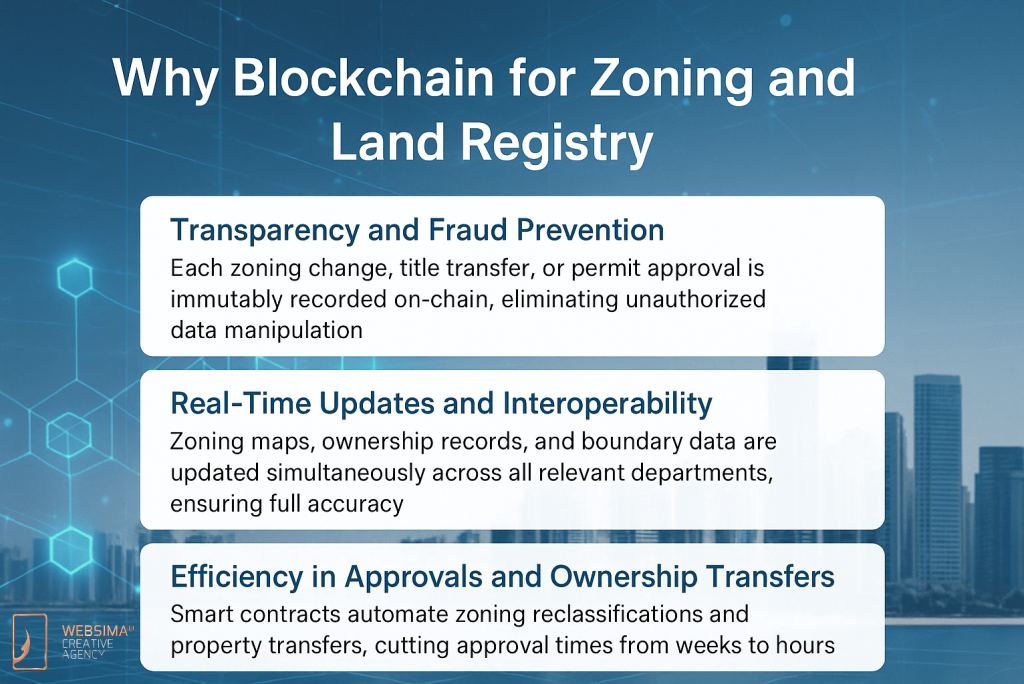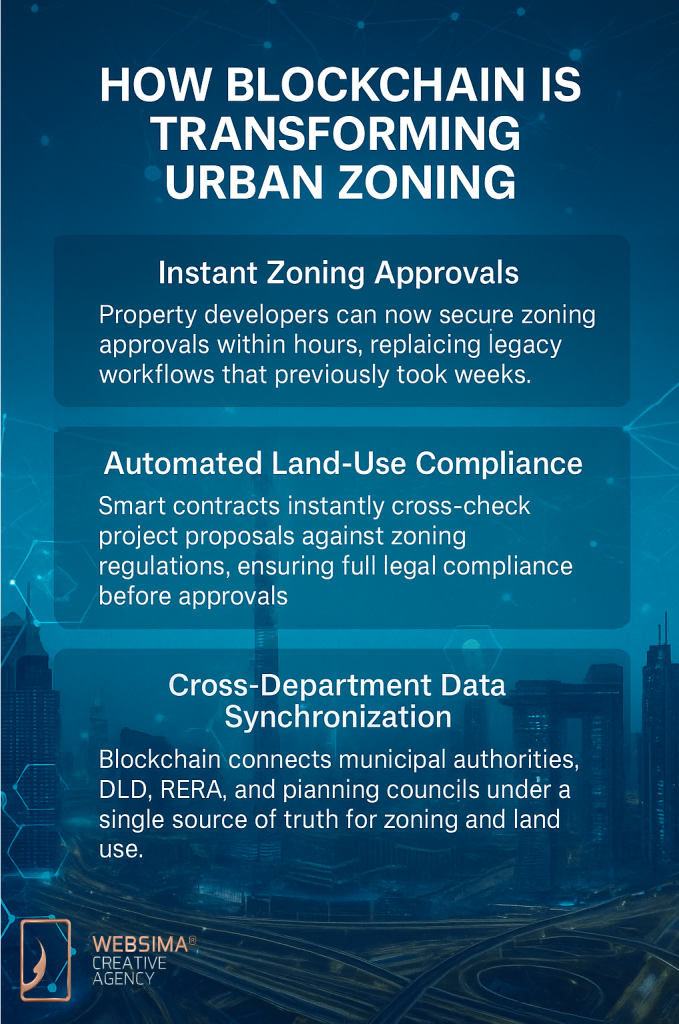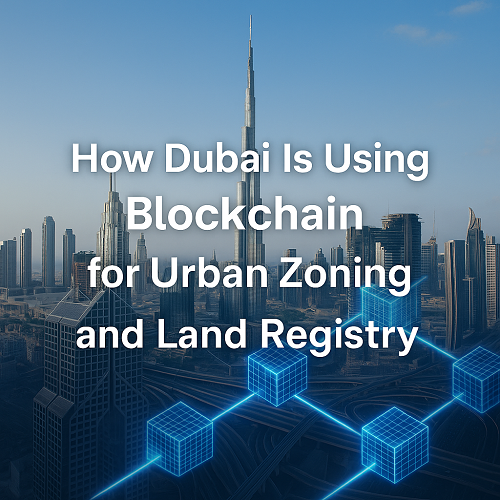Table of Contents
- Introduction
- Dubai’s Blockchain Vision and Smart City Agenda
- Challenges in Traditional Urban Zoning and Land Registry
- Why Blockchain for Zoning and Land Registry
- Transparency and Fraud Prevention
- Real-Time Updates and Interoperability
- Efficiency in Approvals and Ownership Transfers
- Dubai Land Department’s Blockchain Strategy
- Integration with Dubai 2040 Urban Master Plan
- Role of Smart Dubai and Digital Twin Systems
- How Blockchain Is Transforming Urban Zoning
- Instant Zoning Approvals
- Automated Land-Use Compliance
- Cross-Department Data Synchronization
- Impact on Land Registry Systems
- Immutable Ownership Records
- Tokenized Property Titles
- Integration with Geographic Information Systems (GIS)
- Case Studies and Pilot Programs
- Dubai Silicon Oasis Zoning Blockchain Workflow
- DIFC Digital Land Title Platform
- Dubai Land Department + Smart Dubai Collaboration
- Ajman and Sharjah’s Blockchain Adoption
- Benefits for Key Stakeholders
- Urban Planners and Regulators
- Real Estate Developers
- Property Buyers and Investors
- Challenges and Limitations
- Future Trends
- NFTs for Land Titles
- Digital Twins + Blockchain Integration
- Tokenized Development Financing
- AI + Blockchain for Dynamic Zoning
- FAQs
- Final Thoughts
- Websima’s Role in Dubai’s Blockchain Transformation
Introduction
Dubai has long been a pioneer in smart city innovation, leading the world in integrating blockchain and IoT in Dubai smart infrastructure projects and advanced technologies into urban planning and real estate management. With its Dubai Blockchain Strategy 2030, the city aims to digitize 100% of government services, including urban zoning approvals and land registry systems (Digital Dubai). By embedding blockchain into its property and zoning infrastructure, Dubai is tackling long-standing challenges such as ownership disputes, overlapping zoning boundaries, and slow approvals. The shift has positioned “Blockchain Zoning Land Registry Dubai” as one of the most transformative policy implementations shaping the city’s real estate sector in 2025 and beyond.
Dubai’s Blockchain Vision and Smart City Agenda
JUST IN: Ripple Custody to secure tokenized real estate title deeds for Dubai Land Department on $XRP Ledger. pic.twitter.com/hWymQF6o7P
— Whale Insider (@WhaleInsider) July 16, 2025
Dubai’s journey toward blockchain-powered governance began in 2016 with the Dubai Blockchain Strategy, spearheaded by Digital Dubai. The core objectives are:
- Transition all government services onto blockchain platforms
- Enable secure, transparent, and paperless property transactions
- Position Dubai as the first blockchain-powered smart city globally
This strategy complements the Dubai 2040 Urban Master Plan, which focuses on integrating smart urban infrastructure with digital property ecosystems for maximum efficiency and transparency.
Challenges in Traditional Urban Zoning and Land Registry
Before blockchain, Dubai’s urban zoning and land registry systems faced significant issues:
- Data Silos – Records were spread across unconnected departments
- Lengthy Approvals – Manual processes caused weeks-long delays
- Ownership Disputes – Inconsistent records frequently led to legal conflicts
- Fraud Risks – Paper-based land titles were prone to manipulation
- Limited Transparency – Developers and investors lacked real-time zoning data
Blockchain directly addresses these pain points by establishing a tamper-proof, unified property ledger accessible by all authorized authorities.
Why Blockchain for Zoning and Land Registry

Transparency and Fraud Prevention
Each zoning change, title transfer, or permit approval is immutably recorded on-chain, eliminating unauthorized data manipulation.
Real-Time Updates and Interoperability
Zoning maps, ownership records, and boundary data are updated simultaneously across all relevant departments, ensuring full accuracy.
Efficiency in Approvals and Ownership Transfers
Smart contracts automate zoning reclassifications and property transfers, cutting approval times from weeks to hours.
Dubai Land Department’s Blockchain Strategy
Integration with Dubai 2040 Urban Master Plan
The Dubai Land Department (DLD) is leading property-related blockchain transformation, digitizing all land registries, title deeds, and zoning systems by 2030.
According to Gulf News, Dubai recorded AED 431 billion in property transactions during H1 2025, highlighting the growing need for efficient, secure data platforms.
Role of Smart Dubai and Digital Twin Systems
Blockchain is integrated with digital twin technologies, allowing planners to simulate zoning changes in real time and instantly validate property boundary impacts.
How Blockchain Is Transforming Urban Zoning

Instant Zoning Approvals
Property developers can now secure zoning approvals within hours, replacing legacy workflows that previously took weeks.
Automated Land-Use Compliance
Smart contracts instantly cross-check project proposals against zoning regulations, ensuring full legal compliance before approvals.
Cross-Department Data Synchronization
Blockchain connects municipal authorities, DLD, RERA, and planning councils under a single source of truth for zoning and land use.
Impact on Land Registry Systems
Immutable Ownership Records
Blockchain-based registries secure tamper-proof property titles, eliminating ownership disputes.
Tokenized Property Titles
Dubai has launched its real estate tokenisation project, allowing investors to hold fractionalized digital ownership of prime properties (Dubai Media Office).
Integration with Geographic Information Systems (GIS)
By connecting blockchain with GIS tools, Dubai ensures real-time synchronization of property boundaries, ownership statuses, and zoning classifications.
Case Studies and Pilot Programs
Dubai Silicon Oasis Zoning Blockchain Workflow
The Dubai Silicon Oasis Authority introduced a blockchain zoning validation platform, reducing permit processing times by 80%.
DIFC Digital Land Title Platform
The Dubai International Financial Centre implemented smart title deed systems, integrating blockchain to automate ownership transfers and legal verification.
Dubai Land Department + Smart Dubai Collaboration
Through this partnership, ownership verification times have dropped from seven days to one hour.
Ajman and Sharjah’s Blockchain Adoption
Ajman uses blockchain for title authentication, while Sharjah has adopted it for automated zoning approvals, signaling country-wide adoption.
Benefits for Key Stakeholders
Urban Planners and Regulators
- Real-time zoning enforcement
- Integrated development data
- Simplified environmental approvals
Real Estate Developers
- Faster permits and approvals
- Transparent access to updated zoning data
- Reduced administrative bottlenecks
Property Buyers and Investors
- Instant title verification
- Lower due diligence costs
- Seamless tokenized ownership options
Challenges and Limitations
- High Integration Costs: Migrating legacy records is resource-intensive
- Data Privacy: Requires secure frameworks for cross-agency sharing
- Uneven Adoption Rates: Smaller municipalities face technical constraints
Future Trends
NFTs for Land Titles
Dubai is testing NFT-based title deeds, enabling secure peer-to-peer property transfers.
Digital Twins + Blockchain Integration
Blockchain combined with digital twins will allow urban planners to simulate zoning changes and assess impacts instantly.
Tokenized Development Financing
Developers will increasingly tokenize real estate projects, opening fractional investment opportunities to a broader investor base.
AI + Blockchain for Dynamic Zoning
AI-driven zoning algorithms will autonomously adjust classifications, automatically updating blockchain registries.
FAQs
Will Dubai property titles become NFTs?
Yes, DLD is actively piloting NFT-based property deeds for secure and seamless ownership transfers.
How does blockchain speed up property transfers?
Smart contracts automate approvals and verification, reducing transaction times from weeks to mere hours.
Is blockchain zoning legally recognized in Dubai?
Yes, Dubai has integrated blockchain into its land registry frameworks under RERA oversight.
How does blockchain benefit property buyers?
It enables instant verification of titles, zoning permissions, and encumbrances, significantly reducing risk.
Is fractional ownership part of this initiative?
Absolutely. Dubai’s real estate tokenisation project already supports fractional ownership models.
Final Thoughts
Dubai’s integration of blockchain zoning and land registry systems is revolutionizing urban planning, property ownership, and real estate investment. By merging secure registries, digital title deeds, and smart contracts, the city is redefining how property data is stored, accessed, and transferred.
For regulators, developers, and investors, this transformation means faster approvals, greater transparency, and more accessible ownership models. Dubai is setting a global benchmark for blockchain-enabled real estate innovation.
Websima’s Role in Dubai’s Blockchain Transformation
At Websima, we design custom blockchain solutions that power Dubai’s next-gen property ecosystem:
- Smart contracts for automated zoning and title transfers
- Tokenization platforms enabling fractional property investments
- Web3-ready integrations aligned with DLD and Smart Dubai requirements
Partner with Websima to Build Blockchain-Powered Property Solutions





